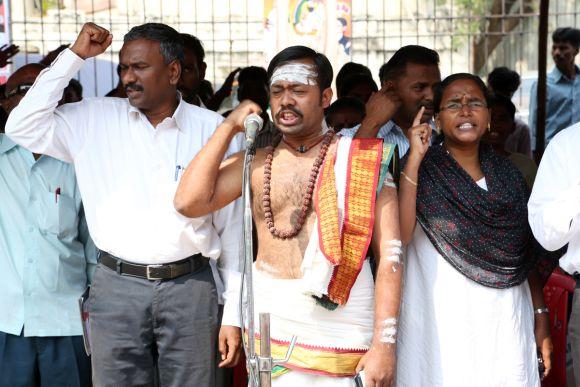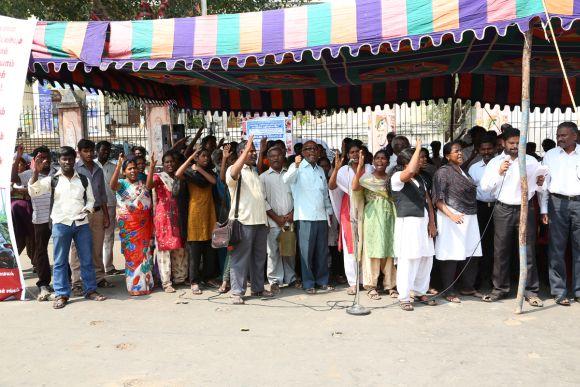
Tamil Nadu students trained in priesthood, who have been denied jobs in temples because of their caste, have decided to fight it out in court, reports S Saraswathi
More than four years after having completed their year-long training programme in priesthood, the first and only batch of 206 students are still awaiting jobs in Tamil Nadu. "We trained from 5.30 every morning to 8 at night with just a break of an hour-and-a-half each day for more than a year, hoping to get a job at the end of the programme. But all our efforts have been in vain," says V Ranganathan, who trained at the Archakar training school, Tiruvannamalai, the temple town near Chennai famous for the Sri Ramana ashram and the Arunachaleswar temple.
"When the Dravida Munnetra Kazhagam government first introduced this training programme, all of us were promised jobs, but now four years later, not one of us has a job," he says. V Ranganathan is now the coordinator of the Tamil Nadu Government Trained Archakar Students Association, which was set up to demand employment from the government for the graduates.
...

It all started in July 2006, when the state government, then run by the DMK, issued an ordinance declaring that suitably trained and qualified Hindus, without "discrimination of caste, creed, custom or usage", would be appointed as archakas. Under the 'Anaivarum Archakar Aagalaam' (everyone can become priests) scheme, training centres were started in Madurai, Palani, Tiruchendur, Tiruvannamalai, Chennai and Tiruchi.
However, the ordinance was challenged in the Supreme Court by the Adi Saiva Sivachariyargal Sangam, Thenindia Thirukoil Archakargal Paripalana Sabai and others, who claimed that this was a sacrilegious interference in the Hindu religion and violated the secular Constitution. Later, when the court restrained the government from hiring them, the TN government promptly abandoned the project and the students.
"I was doing my 1st year BCom when I heard about this programme," says Prabhakar, another student, who helps his father at a small temple near his home in Pondicherry. "I discontinued my studies to register for the course and today I really regret my decision. Most of us have lost all hope of ever getting a job. Some of us who are lucky have got jobs in small, privately owned temples and that too because of our skin colour. My friend who is dark-skinned was refused the job. This kind of discrimination is so humiliating," he says. "Even during training, we faced a lot of degradation. Initially no one came forward to teach us the Sanskrit hymns and then later the priests who agreed to teach us were also threatened and abused."
...

Among the students who trained for the course were 76 students from the backward community, 55 from the most backward community and 34 Dalits.
"At least during the DMK regime we had some hope, but today everything has changed, who is going to help us now," asks Murugan, who currently works at a flower shop near the Thiruvannamalai temple. "The future seems really bleak, I thought I would get a government job and settle down, but now I am really not sure what to do," he says.
Hari from Salem is one of the more fortunate students. He and a couple of his friends have got jobs in some of the local temples, though they still yearn for the job the government promised them. There are more than 35,000 temples administered by the Hindu Religious and Charitable Endowments department of the state government.
"Today many Brahmins have left their jobs as priests to work as doctors and engineers, so there is definitely a requirement for trained archakars," he says. "We are more than eligible for the job. We have received proper training and are well versed in the various rites and rituals to be performed and we can recite mantras in both Tamil, as well as Sanskrit. It is wrong on their part to deny us jobs based on our caste; jobs should be based on qualification. There has been so much progress in our country in the last 65 years, but we still have to mention our caste in the school admission forms, it is totally unnecessary," he complains.
The Human Rights Protection Centre has taken up their cause and has been helping them for the last three years. They recently organised a demonstration near the Memorial Hall, Chennai, to condemn the action of the government to sustain untouchability in temples.
"We helped the students to get organised and also impleaded them in the case," says S Raju, state coordinator, Human Rights Protection Centre. "After nearly five years and several adjournments, the case has finally come to trial. We are hoping for a positive judgment. Our Constitution has legally abolished untouchability and considers it a crime against humanity, than how can we justify this kind of untouchability in temples? It is no longer the question of only jobs; it is our fundamental right we are fighting for. Can we justify the practice of untouchability as a religious right?" he questions.
...

The students who despaired of the case ever coming to trial are now hopeful. "At least now we can put forth our argument. They say that the idols are extremely sacred and our touching them will make them impure and the gods would stop residing in them. How can our mere touch defile the idol? The Thiruvannamalai temple has a beautiful idol of Goddess Saraswathi and throughout our training we students worshipped the idol and performed puja, but now the temple staff has abandoned the deity claiming that we have desecrated it," says Ranganathan.
Soundarajan, who belongs to the Agamudayar community (BC) says, "I was working in a small temple in Pondicherry, but could not makes ends meet as I got married last April. A few weeks ago I started working at a sandblasting company near Karapakkam, Chennai, but this is not what I want to do. I come from a poor background, my mother is a cook and my father a tailor, a government job would really have been very helpful."
Though Ranganathan runs a computer centre and is trained in desktop publishing, he is determined to fight. He has recently completed a one-year diploma course in conducting temple rituals from another private university in Chennai. "We are all working in temporary jobs just to sustain ourselves; and most of us barely make the minimum wages. It is like our life has been put on hold; it is more than four years now, hopefully the government will make good on its promise and give us jobs this year," he says.
...